- Clone
- S18024F (See other available formats)
- Regulatory Status
- RUO
- Other Names
- Toll-like receptor (TLR) 7, CD287
- Isotype
- Rat IgG2a, κ
- Ave. Rating
- Submit a Review
- Product Citations
- publications
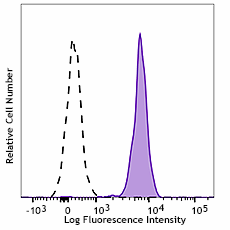
-

Human peripheral blood plasmacytoid dendritic cells were stained with anti-human CD304, fixed and permeabilized using Cyto-Fast™ Fix/Perm Buffer Set (Cat. No. 426803), and intracellularly stained with anti-human TLR7 (clone S18024F) APC (filled histogram), or rat IgG2a, κ APC isotype control (open histogram).
| Cat # | Size | Price | Quantity Check Availability | Save | ||
|---|---|---|---|---|---|---|
| 376905 | 25 tests | 172 CHF | ||||
| 376906 | 100 tests | 397 CHF | ||||
Toll-like receptor (TLR) 7, also known as CD287 is a type 1 transmembrane protein, member of the TLR receptor family. TLR7 is expressed intracellularly in plasmacytoid dendritic cells, myeloid cells, and B lymphocytes and plays an important role in the innate immune response by binding single-stranded RNA (ssRNA). TLR7 signals through MyD88, which leads to the activation and secretion of IFN-α/β and other inflammatory cytokines.
Product DetailsProduct Details
- Verified Reactivity
- Human
- Antibody Type
- Monoclonal
- Host Species
- Rat
- Formulation
- Phosphate-buffered solution, pH 7.2, containing 0.09% sodium azide and BSA (origin USA)
- Preparation
- The antibody was purified by affinity chromatography and conjugated with APC under optimal conditions.
- Concentration
- Lot-specific (to obtain lot-specific concentration and expiration, please enter the lot number in our Certificate of Analysis online tool.)
- Storage & Handling
- The antibody solution should be stored undiluted between 2°C and 8°C, and protected from prolonged exposure to light. Do not freeze.
- Application
-
ICFC - Quality tested
- Recommended Usage
-
Each lot of this antibody is quality control tested by intracellular immunofluorescent staining with flow cytometric analysis. For flow cytometric staining, the suggested use of this reagent is 5 µL per million cells in 100 µL staining volume or 5 µL per 100 µL of whole blood. It is recommended that the reagent be titrated for optimal performance for each application.
- Excitation Laser
-
Red Laser (633 nm)
- Application Notes
-
Clone S18024F can be used for blocking R848-activated IL8 cytokine secretion (tested on 293XL/TLR7 cell line) and for intracellular flow cytometry.
- RRID
-
AB_2924568 (BioLegend Cat. No. 376905)
AB_2924568 (BioLegend Cat. No. 376906)
Antigen Details
- Structure
- Type 1 transmembrane protein, member of the Toll-like receptor (TLR) family
- Distribution
-
Expressed intracellularly in plasmacytoid dendritic cells, myeloid cells, and B lymphocytes, Monocytes
- Function
- Pattern recognition receptor that detects single-stranded RNA, induces proinflammatory cytokine production
- Interaction
- B cells, Dendritic cells
- Ligand/Receptor
- Single-stranded RNA
- Cell Type
- B cells, Dendritic cells
- Biology Area
- Immunology, Innate Immunity
- Molecular Family
- CD Molecules, Innate Immune Signaling
- Gene ID
- 51284 View all products for this Gene ID
- UniProt
- View information about TLR7 on UniProt.org
Related FAQs
Other Formats
View All TLR7 Reagents Request Custom Conjugation| Description | Clone | Applications |
|---|---|---|
| PE anti-human TLR7 | S18024F | ICFC |
| FITC anti-human TLR7 | S18024F | ICFC |
| Brilliant Violet 421™ anti-human TLR7 | S18024F | ICFC |
| Ultra-LEAF™ Purified anti-human TLR7 | S18024F | Block,ICFC |
| APC anti-human TLR7 | S18024F | ICFC |
| TotalSeq™-B1506 anti-human TLR7 Antibody | S18024F | ICPG |
Customers Also Purchased
Compare Data Across All Formats
This data display is provided for general comparisons between formats.
Your actual data may vary due to variations in samples, target cells, instruments and their settings, staining conditions, and other factors.
If you need assistance with selecting the best format contact our expert technical support team.
-
PE anti-human TLR7
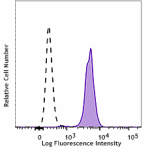
Human peripheral blood plasmacytoid dendritic cells were sta... -
FITC anti-human TLR7
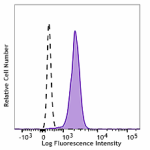
Human peripheral blood plasmacytoid dendritic cells were sta... -
Brilliant Violet 421™ anti-human TLR7
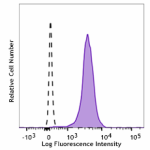
Human peripheral blood plasmacytoid dendritic cells were sta... -
Ultra-LEAF™ Purified anti-human TLR7
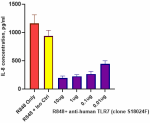
Human 293XL-hTLR7 transfected cells were treated with R848 o... 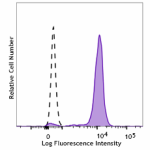
Human peripheral blood plasmacytoid dendritic cells were sta... -
APC anti-human TLR7
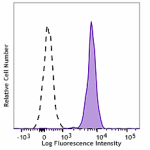
Human peripheral blood plasmacytoid dendritic cells were sta... -
TotalSeq™-B1506 anti-human TLR7 Antibody
 Login / Register
Login / Register 









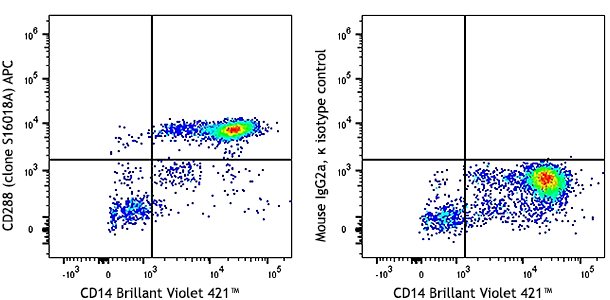
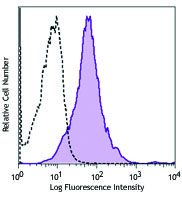
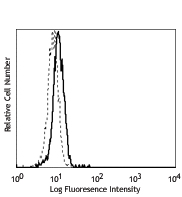
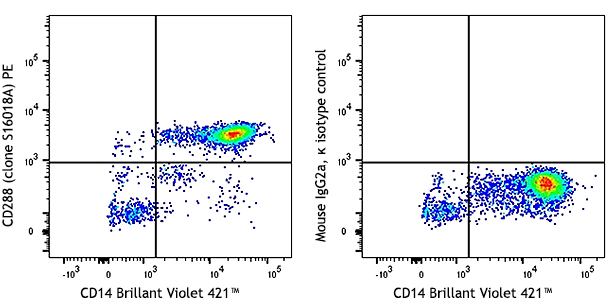



Follow Us